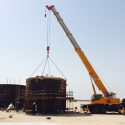
Some things just don’t ship well across the ocean. Oilfield storage tanks are really just light, big bags of air, and so, it is difficult to justify shipping low-pressure, low cost storage tanks across the ocean. The shipping costs tend to exceed fabrication costs. So what to do when your client says “but I really
